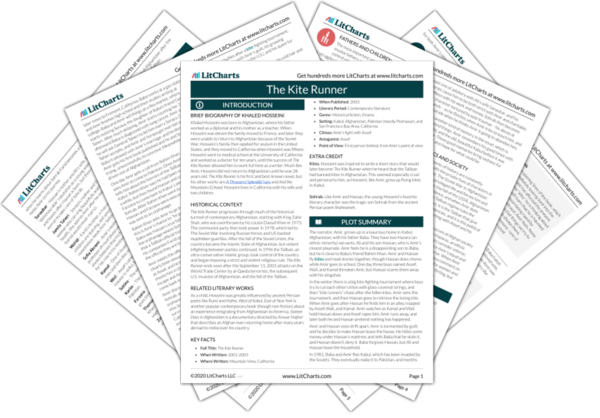The movements of history are constantly interfering with the private lives of characters in The Kite Runner. The Soviet War in Afghanistan interrupts Amir’s peaceful, privileged life and forces him and Baba to flee to America. After the fall of the USSR, Afghanistan continues to be ravaged by violence, and when Amir does finally return to find Sohrab, the Taliban regime rules the country with violent religious laws. It is the Taliban that give Assef an outlet for his sadistic tendencies, and it is this political state that facilitates Amir’s final meeting with Assef and his redemptive beating.
Hosseini also critiques the sexism and racism of Afghan society throughout the book. Ali and Hassan are Hazaras, an ethnic group that most Afghans (who are Pashtun) consider inferior, though Hosseini makes it clear that Hassan is Amir’s equal and in many ways morally and intellectually superior. When Amir starts courting Soraya, both Hosseini and Soraya comment on the double standard that Afghan society holds for women and men. Men are forgiven for being promiscuous or flirting, but women will be shamed and gossiped about for life.
Politics and Society ThemeTracker

Politics and Society Quotes in The Kite Runner
Chapter 4 Quotes
The curious thing was, I never thought of Hassan and me as friends either… Never mind that we spent entire winters flying kites, running kites. Never mind that to me, the face of Afghanistan is that of a boy with a thin-boned frame… a boy with Chinese doll face perpetually lit by a harelipped smile. Never mind any of these things. Because history isn’t easy to overcome. Neither is religion. In the end, I was a Pashtun and he was a Hazara, I was Sunni and he was Shi’a, and nothing was ever going to change that.
Chapter 7 Quotes
“But before you sacrifice yourself for him, think about this: Would he do the same for you? Have you ever wondered why he never includes you in games when he has guests? Why he only plays with you when no one else is around? I’ll tell you why, Hazara. Because to him, you’re nothing but an ugly pet…”
“Amir agha and I are friends,” Hassan said.
In the end, I ran.
I ran because I was a coward. I was afraid of Assef and what he would do to me… I actually aspired to cowardice, because the alternative, the real reason I was running, was that Assef was right: Nothing was free in this world. Maybe Hassan was the price I had to pay, the lamb I had to slay, to win Baba. Was it a fair price? The answer floated to my conscious mind before I could thwart it: He was just a Hazara, wasn’t he?
Chapter 10 Quotes
In the morning, Jalaluddin… would probably think we’d gone out for a stroll or a drive. We hadn’t told him. You couldn’t trust anyone in Kabul anymore – for a fee or under threat, people told on each other, neighbor on neighbor, child on parent, brother on brother, servant on master, friend on friend.
Chapter 11 Quotes
Long before the Roussi army marched into Afghanistan, long before villages were burned and schools destroyed… Kabul had become a city of ghosts for me. A city of harelipped ghosts.
America was different. America was a river, roaring along, unmindful of the past. I could wade into this river, let my sins drown to the bottom, let the waters carry me someplace far. Someplace with no ghosts, no memories, and no sins.
Chapter 13 Quotes
As I drove, I wondered why I was different. Maybe it was because I had been raised by men; I hadn’t grown up around women and had never been exposed firsthand to the double standard with which Afghan society sometimes treated them… But I think a big part of the reason I didn’t care about Soraya’s past was that I had one of my own. I knew all about regret.
Chapter 16 Quotes
“The war is over, Hassan,” I said. “There’s going to be peace, Inshallah, and happiness and calm. No more rockets, no more killing, no more funerals!” But he just turned off the radio and asked if he could get me anything before he went to bed.
A few weeks later, the Taliban banned kite fighting. And two years later, in 1998, they massacred the Hazaras in Mazar-i-Sharif.
Chapter 19 Quotes
He pointed to an old man dressed in ragged clothes trudging down a dirt path, a large burlap sack filled with scrub grass tied to his back. “That’s the real Afghanistan, Agha sahib. That’s the Afghanistan I know. You? You’ve always been a tourist here, you just didn’t know it.”
Chapter 21 Quotes
“How much more do you need to see? Let me save you the trouble: Nothing that you remember has survived. Best to forget.”
“I don’t want to forget anymore,” I said.











